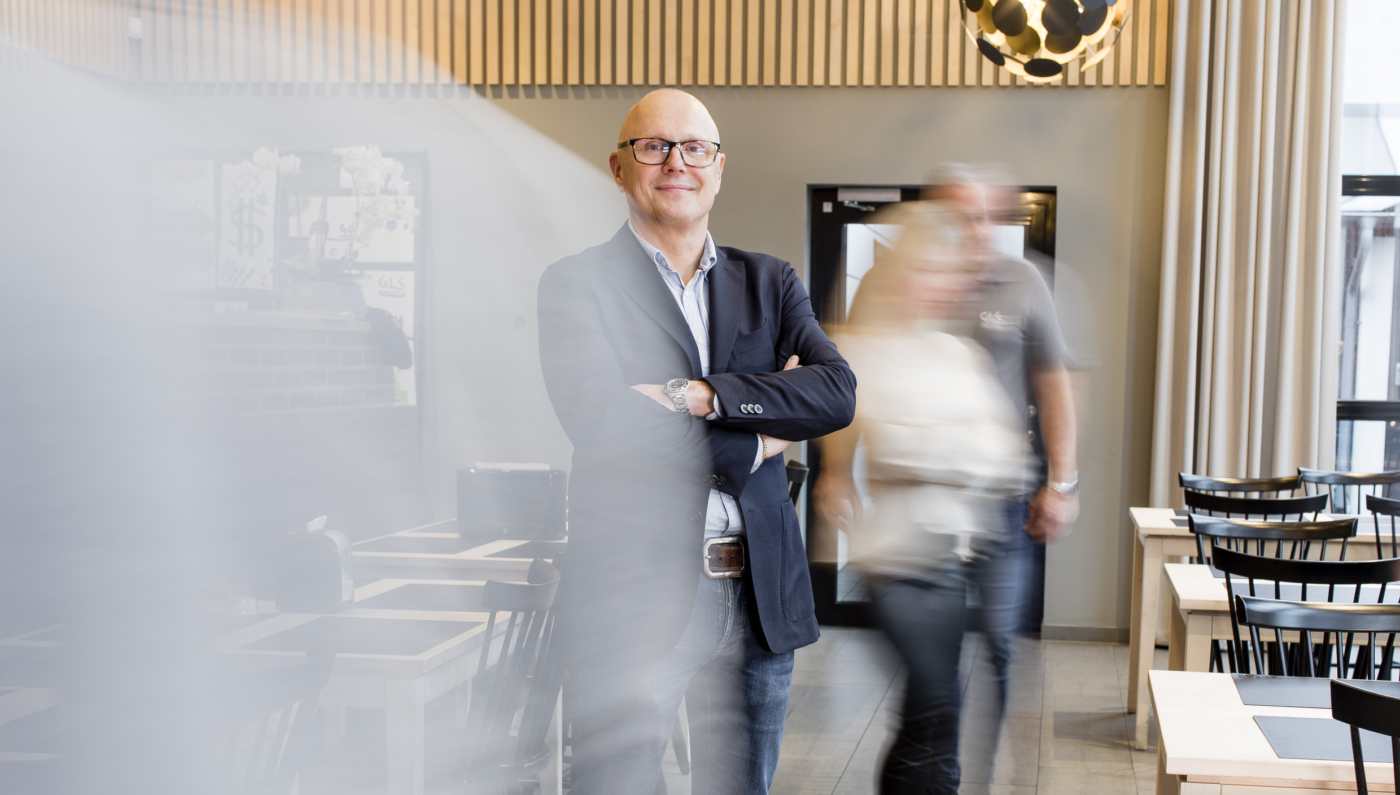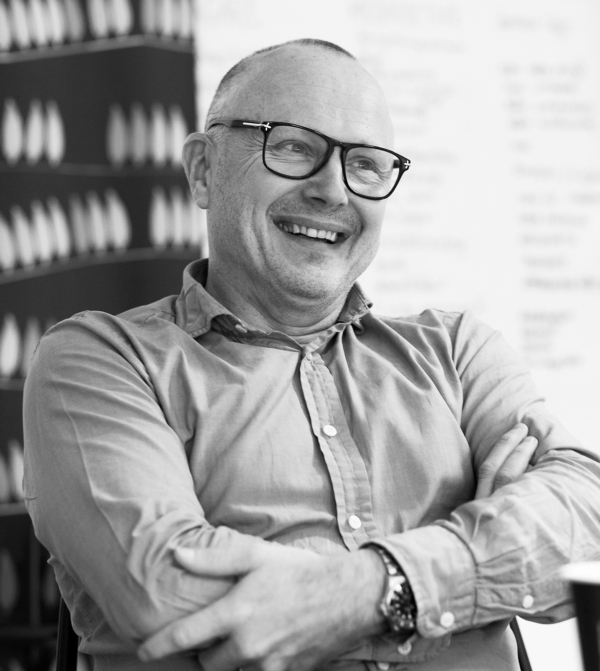
We are stronger together.
The entrepreneurial spirit has been alive in Gnosjö since the 17th century. The history of GLS Industries doesn’t quite go as far back as that, but began back in 1940, when David Petersson set up Peterssons Metallfabrik. Since then, the company has grown to become a corporate group with more than 150 employees. The vision to become Europe’s leading sheet metal processor is more relevant than ever, and as GLS assumes an increasingly solid position as a leading supplier of sheet metal processing, long-term work on sustainability has moved higher up the agenda.
Meet some of our ambassadorsThe story
In 1940, Gnosjö resident David Petersson decided to move his family back to the place he was born, in the forests of Småland. In the true Gnosjö spirit, there was already a business making metal products in the building they moved into. Under the company name of David Peterssons Metallfabrik, David started to manufacture metal products for customers including Garo and SJ.
Of David’s children, it was the youngest, Jonny, who showed the keenest interest in sales and building customer relationships, and he enjoyed being out in the marketplaces right from the start. After the siblings had run the company following David’s death, Jens’ uncle, Erik, decided to buy out the other five siblings in 1974. When Erik died suddenly in 1982, Jonny took over as owner and continued to run the business in the same direction.
When Jonny took over the business, his son Jens Petersson was 11 years old, and even though Jens lent a hand in the factory now end then during his teenage years, there was no definite plan for him to take over after his father. Jens qualified as a toolmaker and found a job in a nearby business, where he worked in the early 1990s. There was no clear plan for the future at David Peterssons Metallfabrik, and the recession was making it difficult for the business to thrive. When Jens’ father died suddenly from a heart attack, Jens was only 22 years old.
He then started working full time at David Peterssons Metallfabrik. But the tough conditions at the time made it difficult to see a clear future for the company, which was being run on a very small scale. The focus was therefore on keeping production running and finishing the orders that were in the book, before closing down the business. But as Jens and the one single employee at the time gradually became more and more involved in production, the customers and the business in general, his attitude changed, and Jens started to recognise the potential of this small metal factory.
This caused Jens to decide to step up a gear, and he started to look more actively for new customers and assignments. They invested in their very first Amada edge press, followed soon afterwards by a punching machine. At the end of the 90s, Jens decided to change the name of the company. At the time, they were broadening their laser cutting range, so the company was named Gnosjö Laserstans. For the very first time, the company was now also going to exhibit at the Elmia trade fair in Jönköping. Despite the new name and the fact that the laser machine had not yet been purchased, Jens was firmly resolved to invest in the future and started to seriously market laser cutting solutions. This proved a smart move, with high levels of demand, and by the early 2000s they had net sales of more than SEK 8 million. The decade continued at the same expansive tempo, they built totally new, suitable premises, invested in another edge press, a folding machine and another punching machine.

”I suppose I’ve always had that drive to build and keep on developing, to make everything a little better all the time.”
In the early 2010s, the importance of setting out a clear vision became evident. The drive and desire to develop the business had been there since Jens took over, but they now wanted to get everyone on board. The vision to become Europe’s leading sheet metal processor was adopted, and the company had a clear objective to aim for. In 2013, Gnosjö Laserstans acquired the neighbouring company Lasercentrum, and in 2016 the companies merged, with the two buildings united by a canteen in the middle. The canteen became a symbolic meeting place for the two companies. The desire and the drive to continue to invest meant that they felt ready to take the next step for the company’s brand and image. They had started to sense that they had come as far as they could as Gnosjö Laserstans, and after having expanded to both Värnamo and Ljungby, the company was given the more global name of GLS Industries.
The vision to become Europe’s leading sheet metal processor is more relevant now than ever. As GLS is assuming an increasingly solid position as a leading supplier of sheet metal processing, long-term work on sustainability has also started to take shape. Sustainability is now viewed as in increasingly important focus area in the company, one that will guide the choices and initiatives of the next few years. Jens’ ability to focus in detail on the company’s next step has created a story that personifies the image of a company in the true Gnosjö spirit.
1940
David Peterssons Metallfabrik
Gnosjö resident David Petersson moves back to the place he was born and sets up David Peterssons Metallfabrik. They manufacture products for customers such as Garo and SJ.
1974
Erik buys out his siblings
After the siblings had run the company following the death of their father, David, Jens’ uncle, Erik, decides to buy out the other five siblings.
1982
Jonny becomes the sole owner of David Peterssons Metallfabrik
When Erik dies suddenly, Jonny takes over as owner and continues to run the business in the same direction.
1993
Jens takes over the company
Jens Petersson takes over the company after the death of his father.
1998
Invests in an edge press
The company invests in its first Amada edge press, shortly followed by a punching machine, and starts to expand its range of sheet metal.
1999
Name change to Gnosjö Laserstans
The company changes its name to Gnosjö Laserstans and exhibits at the Elmia trade fair in Jönköping.
2012
Starts work to become a Lean-based business
Involvement in the Production Leap programme initiated the move to become a Lean-based business.
2013
Acquires Lasercentrum
The vision to become Europe’s leading sheet metal processor is established, and the acquisition of neighbouring company Lasercentrum takes place.
2019
Name change to GLS Industries
Having expanded in both Värnamo and Ljungby, the company changes to the more global name of GLS Industries.
2021
Starts long-term work on sustainability
The Eco Leap project is launched, initiating long-term work on sustainability at GLS Industries. This becomes an increasingly important focus area that will guide the directions and initiatives of the next few years.
GLS Industries is a
everyone takes care
of each other.
Maria Nilsson , employed since 2014
GLS Industries is a sheet metal working group with two production units located in Gnosjö and Ljungby. With well-trained staff and extensive sheet metal product experience, we deliver everything from bent sheet metal to advanced sheet metal machining. Our state-of-the-art machinery for die-cutting, bending, laser cutting and finishing makes us a leading player in sheet metal machining.
